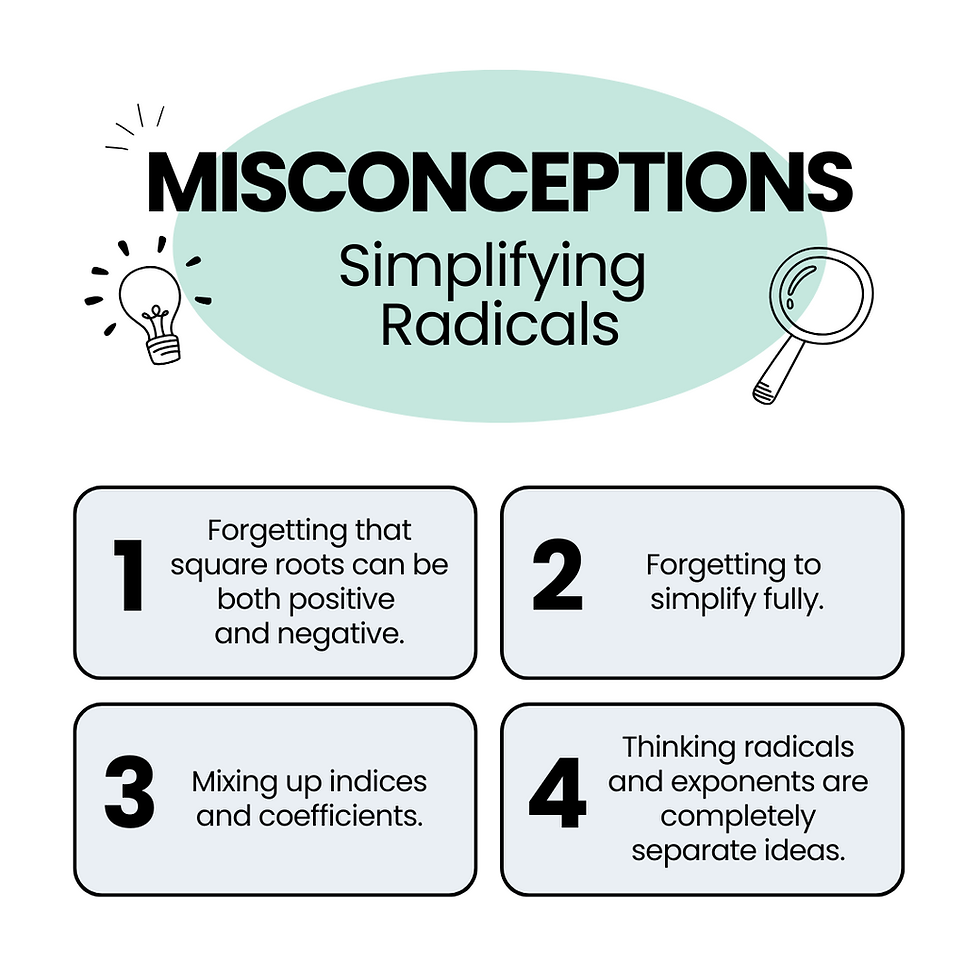Simplifying Rational Expressions - Misconceptions
- Hazel Learning

- Sep 4, 2025
- 2 min read
Simplifying rational expressions is a fundamental skill in algebra, yet students often encounter challenges that can hinder their understanding. These challenges are frequently rooted in misconceptions that, if unaddressed, can lead to persistent errors. This article delves into three prevalent misconceptions in simplifying rational expressions, providing insights and strategies to help educators guide students toward a clearer comprehension.

Misconception 1: Canceling Terms Instead of Factors
A frequent error is treating algebraic sums in the numerator and denominator as cancelable terms. For example, students might simplify incorrectly the following expressions:
Students often reduce expressions by overlooking the need for factoring before canceling. Barcellos (2005) reported that students often apply arithmetic shortcuts inappropriately in algebraic contexts, failing to distinguish between terms and factors. These invalid cancellations stem from overgeneralizing arithmetic rules to algebraic expressions. While other studies on this specific error are limited, broader research on algebraic error patterns supports these findings. A diagnostic study of grade 8 learners by Moru & Mathunya (2022) found that overgeneralizing prior knowledge to new symbolic contexts is a root cause of algebraic misconceptions.
Misconception 2: Forgetting Restrictions on the Denominator
A common mistake students make when simplifying rational expressions is ignoring restrictions on the denominator. Even if they simplify an expression correctly, they often forget that certain values of the variable make the denominator zero, which makes the entire expression undefined.
For example:
This simplification overlooks that the original denominator means x ≠ 1. Without stating this restriction, the simplified expression looks valid for all values of x, which is misleading.
This misconception highlights the importance of teaching students that simplification is not just about canceling or reducing - it also requires thinking about domain restrictions.
Misconception 3: Confusing Rational Expressions with Numeric Fractions
Another error is treating algebraic rational expressions simplistically, akin to numeric fractions - canceling without factoring or ignoring variables entirely. Moru & Mathunya’s study on grade 8 student errors found that overgeneralization of arithmetic routines to algebraic contexts repeatedly causes mistakes. Learners often fail to adapt strategies, such as canceling across sums or misusing addition and subtraction in fraction operations.
Additionally students’ misconceptions with rational expressions indicate that imprecise language and reliance on procedural memory contribute to flawed reasoning around simplifying expressions.
Addressing these misconceptions is vital for students to develop a robust understanding of simplifying rational expressions. By emphasizing the importance of canceling only common factors, recognizing and stating restrictions, and distinguishing between numerical fractions and rational expressions, educators can help students navigate these challenges effectively.
References:
Aydin-Güç, S., & Aygün, N. (2021). Common algebraic errors and misconceptions in secondary mathematics education.Journal of Mathematics Education, 14(1), 55–72. ERIC Document Reproduction Service No. EJ129874.
Barcellos, M. P. (2005). Students’ difficulties in algebra: A focus on the misconceptions and errors in simplifying algebraic expressions. Educational Studies in Mathematics, 59(2), 123–150.
Moru, A. & Mathunya, M. (2022). Exploring algebraic misconceptions: Grade 8 learners’ understanding of rational expressions. International Journal of Education and Research, 10(4), 45–60.



Comments